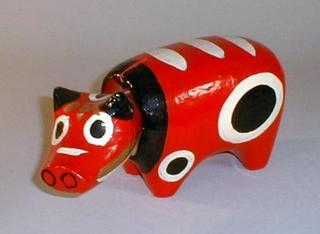:::::::::::::::::::::::::::::::::::::::::::::::::::::::::::::::::::::::::::::::::::::::::::::::::::::::::::::::::::::::::::::::::::::::::::::::::::::::::::::::::::::::::::
| akabeko あかべこ / 赤べこ Aka-Beko  The most important of the Aizu Papermachee Dolls is the Red Oxen, Akabeko. The red color is auspicious for warding off illnesses. Many papermachee dolls of the Aizu area are called "Red Things" (akamono) for this reason. Red things are also good luck symbols for childrearing. . Akamono - red things and smallpox 疱瘡 .  source : Art & Bell by Tora Clay Bell 土鈴 dorei  Stamp from December 1960 with Akabekko and a golden cow from Morioka 金のべこっこ ..............................................................................................................................................  source : www.dinos.co.jp/p Aizu Hariko - sakura 会津張り子「さくら」 . sakura さくら / 桜 cherry blossom art motives . .............................................................................................................................................. . Mingei Kukkii みんげいクッキー Mingei Folk Art Cookies . 会津 笑顔の赤べこプリントクッキー Print Cookie Akabeko ::::::::::::::::::::::::::::::::::::::::::::::::::::::::::::::::::::::::::::::::::::::::::::::::::::: quote Akabeko is a famous cow amulet in the Aizu region of Japan. Aka means "red" and beko is Aizu dialect for "cow." The akabeko papier-mache cow is a popular souvenir from Fukushima Prefecture. There are a few stories about how the akabeko came to be revered. According to local folklore, in the year 807 A.D., cows were used to haul materials to construct Enzoji temple 圓蔵寺 in Yanaizu 柳津. When the temple was completed, one particular red cow refused to leave the site. Legend has it that the cow even turned to stone after having given its soul to the Buddha. The townspeople, duly impressed with the cow's loyalty and no doubt its ability to turn itself to stone, made small effigies of the cow, painted them red, and gave them to children as toys. Years later, when a bout of smallpox swept the country, the children who had these akabeko toys didn't get smallpox. Enzoji holds one of the three famous statues of Kokuzo Bosatsu. 福満虚空蔵尊 Fukuman Kokuzozon Said to have been carved by Kobo Daishi himself. After he finished the statue, he trew some wood chips in the river Tadami as offerings. Whow and behold, they turned into the delicious dace fish, nurrishing the people. . Cow, Ox, Bull and Haiku . :::::::::::::::::::::::::::::::::::::::::::::::::::::::::::::::::::::::::::::::::::::::::::::::::::::  会津張り子赤べこ source : 郷土玩具ガイド ::::::::::::::::::::::::::::::::::::::::::::::::::::::::::::::::::::::::::::::::::::::::::::::::::::: quote Mingei: Japan's Enduring Folk Arts Amaury Saint-Giles (Heian International, second printing 1984) "AKA-BEKO literally translates as red calf. It and all the hundreds of thousands that have been made over the past three and a half centuries are all children (calves) to the original reddish cow which worshipped Buddha and His saving grace in the only way she knew how. A touching tale brings this mingei-hin from the past into the future. A healthful future it is hoped!" Comment of my Haiku Friend L.: Does the red cow have the Buddha nature? "Moo!" ::::::::::::::::::::::::::::::::::::::::::::::::::::::::::::::::::::::::::::::::::::::::::::::::::::: quote Aka-beko, a red cow protecting from smallpox (like Daruma) This whimsical lacquered red papier-mache figure of an ox is known as an “aka-beko” which, literally translated, means red calf or red cow. The head, which is attached by a string, nods up and down and from side to side. Some 350 years ago, the townspeople constructed a large temple there dedicated to Buddha. Heavy loads of lumber had to be transported long distances, and one of the oxen used was a large reddish cow. When the building was completed, she refused to leave the site. Shortly thereafter a member of the ruling clan fashioned a small effigy of the devout cow as a child’s toy. Made of lacquered papier-mache, the free swinging head bobs easily with any movement and delights children of all ages. When a great plague of smallpox swept the country, people appealed to Buddha for deliverance. It was noticed that children who had this toy were not afflicted with the dread disease, and the superstitious local populace began to make similar toys as amulets against illness. Aka-beko are looked upon as omens of good luck and prosperity and are given as gifts at New Year’s and other auspicious occasions. . Engimono 縁起物 for good luck  ::::::::::::::::::::::::::::::::::::::::::::::::::::::::::::::::::::::::::::::::::::::::::::::::::::: . Ko no Su Daruam Dolls 鴻巣達磨 . ..... including - akamono, aka mono 赤もの red things (for good luck) . donkorogoma どんころ独楽 Donkoro spinning top for gambling . including akamono ningyo 赤物人形 Akamono dolls komusoo 虚無僧 Komuso begging monk Saigyoo 西行 the poet Saigyo . ....................................................................... Akamono from Fushimi, Kyoto 花もち童女 / 鯛抱き童子 童子「茶坊主/ 伊勢参り姿の童子 /神功皇后 / 狛犬 /虚無僧 / 乳のまし / 天神さん / 大原女 赤物人形について 一文人形ともいわれ14cmから5cmぐらいの小さな安物の伏見人形で、主に子どもの玩具として作られた。西行、天神、狐、娘、童子などの人形があり、昔は、皿秤ではかり、何文といって売られた。 冨士忠は東山区の本町13丁目(JR・京阪「東福寺」の近く)にて太平洋戦争前までは各種人形を大量に生産していたが、戦後、廃業 - reference : h2.dion.ne.jp/~hushimi/akamono - ::::::::::::::::::::::::::::::::::::::::::::::::::::::::::::::::::::::::::::::::::::::::::::::::::::: understanding humans - the red cow wiggles her head in disbelief . Fukushima after the BIG earthquake March 11, 2011 |
:::::::::::::::::::::::::::::::::::::::::::::::::::::::::::::::::::::::::::::::::::::::::::::::::::::::::::::::::::::::::::::::::::::::::::::::::::::::::::::::::::::::::::
. ushi 丑 ox, oxen (cow, bull, calf) .
. Daruma Dolls from Aizu
[ . BACK to WORLDKIGO . TOP . ]
[ . BACK to DARUMA MUSEUM TOP . ]
- #akabeko #akamono #redthings -
:::::::::::::::::::::::::::::::::::::::::::::::::::::::::::::::::::::::::::::::::::::::::::::::::::::::::::::::::::::::::::::::::::::::::::::::::::::::::::::::::::::::::::

No comments:
Post a Comment